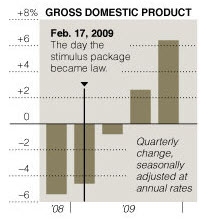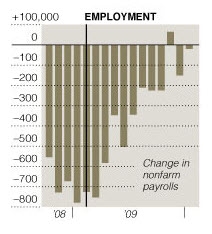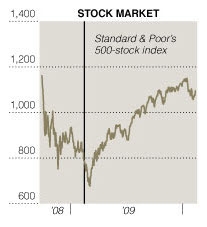Recovery Act More Successful than You Think
by Gary Therkildsen*, 2/17/2010

With the arrival of the one-year anniversary of the Recovery Act, experts and pundits alike are reviewing how the Obama administration's stimulus effort has stacked up thus far. Despite what some in Congress say and in contrast to how the public generally feels, it turns out the Recovery Act has worked pretty well and has been quite a successful piece of public policy.
One of the more convincing pieces on this issue was an article this morning in the New York Times by David Leonhardt, who laid out all the facts and effectively showed how the Recovery Act has created jobs and helped to turn the economy around. Leonhardt didn't use the administration's own data to make the point, rather he relied on outside evaluations from industry analysts from financial houses such as HIS Global Insight, Macroeconomic Advisers, and Moody's.
According to their estimates, the stimulus bill has saved or created between 1.6 million and 1.8 million jobs, and may save or create up to 2.5 million by the end. What's more, the Congressional Budget Office (CBO) – the non-partisan accounting wing of Congress – claims these estimates are conservative.



(click to enlarge)
Source: New York Times
That's not to say that the Recovery act has been flawless. Problems were both structural – too much money went to tax expenditures and not enough went to infrastructure projects – and operational – because some prime recipients falsely reported their congressional districts, it looked like the government was spending money in fictional places. But the stimulus has received much less in the way of celebration compared to detriment, and that's mostly because it's so hard to prove a negative.
It's easy for the White House to say, "Here's a job" to an unemployed worker, but it's a little more difficult for the administration to tell a worker going through hard economic times that they'd really be up the creek without a paddle if it hadn't been for the stimulus effort. Moreover, the Obama administration's optimistic analysis of the economy when assuming office really put the Recovery Act in a bind.
Detractors claim that the stimulus bill didn't work because unemployment went above 10 percent and the White House claimed it wouldn't go above eight. But the high unemployment figures aren't proof that the Recovery Act didn't work, they're proof that the economy was worse than originally thought, and the stimulus has kept the country from degrading into a scene out of Mad Max Beyond Thunderdome.
Of course, the economy isn't recovered yet, and, because the effects of the first stimulus bill will evaporate around the middle of this year, Congress needs to move on a second stimulus soon. The problem is that the conventional wisdom around Capitol Hill is that the country can't afford a second effort, and the Senate has already significantly pared down the House's fairly aggressive jobs bill passed in late December. With a new "jobless era" hanging over our heads, I would argue that the country can't afford not to have a second stimulus.
Image by Flickr user Michael Kappel used under a Creative Commons license.



